- Home
- Kahlil Gibran
Treasured Writings of Kahlil Gibran Page 14
Treasured Writings of Kahlil Gibran Read online
Page 14
Like a skeleton.” The winds and the spray
Together with the burning sun had effaced
The brilliant hues and my boat looked now
Like tattered grey raiment. I could not
Observe these changes from amid my treasures,
For I had blinded my eyes from the inside.
I had gathered the most precious things on
Earth and placed them in a floating chest
Upon the face of the water and returned to
My people, but they cast me away and could
Not see me, for their eyes had been allured
By empty, shimmering objects.
At that hour I left the boat of my thoughts
For the City of the Dead, and sat in the
Midst of the trim graves, contemplating
Their secrets.
Be silent, my heart, until Dawn comes; be
Silent, for the raging tempest is ridiculing
Your inner whispering, and the caves of
The valleys do not echo the vibration of
Your strings.
Be silent, my heart, until Morn comes,
For he who awaits patiently the coming
Of Dawn will be embraced longingly by
Morningtide.
Dawn is breaking. Speak if you are able,
My heart. Here is the procession of
Morningtide….Why do you not speak?
Has not the silence of the night left
A song in your inner depths with which
You may meet Dawn?
Here are the swarms of doves and the
Nightingales moving in the far portion
Of the valley. Are you capable of flying
With the birds, or has the horrible night
Weakened your wings? The shepherds are
Leading the sheep from their folds; has
The phantom of the night left strength
In you so you may walk behind them to
The green prairies? The young men and
Women are walking gracefully toward the
Vineyards. Will you be able to stand
And walk with them? Rise, my heart, and
Walk with Dawn, for the night has passed,
And the fear of darkness has vanished with
Its black dreams and ghastly thoughts and
Insane travels.
Rise, my heart, and raise your voice with
Music, for he who shares not Dawn with
His songs is one of the sons of ever-Darkness.
SECRETS
OF THE HEART
SECRETS OF THE HEART
A MAJESTIC mansion stood under the wings of the silent night, as Life stands under the cover of Death. In it sat a maiden at an ivory desk, leaning her beautiful head on her soft hand, as a withering lily leans upon its petals. She looked around, feeling like a miserable prisoner, struggling to penetrate the walls of the dungeon with her eyes in order to witness Life walking in the procession of Freedom.
The hours passed like the ghosts of the night, as a procession chanting the dirge of her sorrow, and the maiden felt secure with the shedding of her tears in anguished solitude. When she could not resist the pressure of her suffering any longer, and as she felt that she was in full possession of the treasured secrets of her heart, she took the quill and commenced mingling her tears with ink upon parchment, and she inscribed:
“My Beloved Sister,
“When the heart becomes congested with secrets, and the eyes begin to burn from the searing tears, and the ribs are about to burst with the growing of the heart’s confinement, one cannot find expression for such a labyrinth except by a surge of release.
“Sorrowful persons find joy in lamentation, and lovers encounter comfort and condolence in dreams, and the oppressed delight in receiving sympathy. I am writing to you now because I feel like a poet who fancies the beauty of objects whose impression he composes in verse while being ruled by a divine power…. I am like a child of the starving poor who cries for food, instigated by bitterness of hunger, disregarding the plight of his poor and merciful mother and her defeat in life.
“Listen to my painful story, my dear sister, and weep with me, for sobbing is like a prayer, and the tears of mercy are like a charity because they come forth from a living and sensitive and good soul and they are not shed in vain. It was the will of my father when I married a noble and rich man. My father was like most of the rich, whose only joy in life is to improve their wealth by adding more gold to their coffers in fear of poverty, and curry nobility with grandeur in anticipation of the attacks of the black days…. I find myself now, with all my love and dreams, a victim upon a golden altar which I hate, and an inherited honour which I despise.
“I respect my husband because he is generous and kind to all; he endeavours to bring happiness to me, and spends his gold to please my heart, but I have found that the impression of all these things is not worth one moment of a true and divine love. Do not ridicule me, my sister, for I am now a most enlightened person regarding the needs of a woman’s heart—that throbbing heart which is like a bird flying in the spacious sky of love…. It is like a vase replenished with the wine of the ages that has been pressed for the sipping souls…. It is like a book in whose pages one reads the chapters of happiness and misery, joy and pain, laughter and sorrow. No one can read this book except the true companion who is the other half of the woman, created for her since the beginning of the world.
“Yes, I became most knowing amongst all women as to the purpose of the soul and meaning of the heart, for I have found that my magnificent horses and beautiful carriages and glittering coffers of gold and sublime nobility are not worth one glance from the eyes of that poor young man who is patiently waiting and suffering the pangs of bitterness and misery…. That youth who is oppressed by the cruelty and will of my father, and imprisoned in the narrow and melancholy jail of Life….
“Please, my dear, do not contrive to console me, for the calamity through which I have realized the power of my love is my great consoler. Now I am looking forward from behind my tears and awaiting the coming of Death to lead me to where I will meet the companion of my soul and embrace him as I did before we entered this strange world.
“Do not think evil of me, for I am doing my duty as a faithful wife, and complying calmly and patiently with the laws and rules of man. I honour my husband with my sense, and respect him with my heart, and revere him with my soul, but there is a withholding, for God gave part of me to my beloved before I knew him.
“Heaven willed that I spend my life with a man not meant for me, and I am wasting my days silently according to the will of Heaven; but if the gates of Eternity do not open, I will remain with the beautiful half of my soul and look back to the Past, and that Past is this Present…. I shall look at life as Spring looks at Winter, and contemplate the obstacles of Life as one who has climbed the rough trail and reached the mountain top.”
At that moment the maiden ceased writing and hid her face with her cupped hands and wept bitterly. Her heart declined to entrust to the pen its most sacred secrets, but resorted to the pouring of dry tears that dispersed quickly and mingled with the gentle ether, the haven of the lovers’ souls and the flowers’ spirits. After a moment she took the quill and added, “Do you remember that youth? Do you recollect the rays which emanated from his eyes, and the sorrowful signs upon his face? Do you recall that laughter which bespoke the tears of a mother, torn from her only child? Can you retrace his serene voice speaking the echo of a distant valley? Do you remember him meditating and staring longingly and calmly at objects and speaking of them in strange words, and then bending his head and sighing as if fearing to reveal the secrets of his great heart? Do you recall his dreams and beliefs? Do you recollect all these things in a youth whom humanity counts as one of her children and upon whom my father looked with eyes of superiority because he is higher than earthly greed and nobler than inherited grandeur?
“You kn
ow, my dear sister, that I am a martyr in this belittling world, and a victim of ignorance. Will you sympathize with a sister who sits in the silence of the horrible night pouring down the contents of her inner self and revealing to you her heart’s secrets? I am sure that you will sympathize with me, for I know that Love has visited your heart.”
Dawn came, and the maiden surrendered herself to Slumber, hoping to find sweeter and more gentle dreams than those she had encountered in her awakeness….
MY COUNTRYMEN
WHAT do you seek, My Countrymen?
Do you desire that I build for
You gorgeous palaces, decorated
With words of empty meaning, or
Temples roofed with dreams? Or
Do you command me to destroy what
The liars and tyrants have built?
Shall I uproot with my fingers
What the hypocrites and the wicked
Have implanted? Speak your insane
Wish!
What is it you would have me do,
My Countrymen? Shall I purr like
The kitten to satisfy you, or roar
Like the lion to please myself? I
Have sung for you, but you did not
Dance; I have wept before you, but
You did not cry. Shall I sing and
Weep at the same time?
Your souls are suffering the pangs
Of hunger, and yet the fruit of
Knowledge is more plentiful than
The stones of the valleys.
Your hearts are withering from
Thirst, and yet the springs of
Life are streaming about your
Homes—why do you not drink?
The sea has its ebb and flow,
The moon has its fullness and
Crescents, and the Ages have
Their winter and summer, and all
Things vary like the shadow of
An unborn God moving between
Earth and sun, but Truth cannot
Be changed, nor will it pass away;
Why, then, do you endeavour to
Disfigure its countenance?
I have called you in the silence
Of the night to point out the
Glory of the moon and the dignity
Of the stars, but you startled
From your slumber and clutched
Your swords in fear, crying,
“Where is the enemy? We must kill
Him first!” At morningtide, when
The enemy came, I called to you
Again, but now you did not wake
From your slumber, for you were
Locked in fear, wrestling with
The processions of spectres in
Your dreams.
And I said unto you, “Let us climb
To the mountain top and view the
Beauty of the world.” And you
Answered me, saying, “In the depths
Of this valley our fathers lived,
And in its shadows they died, and in
Its caves they were buried. How can
We depart this place for one which
They failed to honour?”
And I said unto you, “Let us go to
The plain that gives it bounty to
The sea.” And you spoke timidly to
Me, saying, “The uproar of the abyss
Will frighten our spirits, and the
Terror of the depths will deaden
Our bodies.”
I have loved you, My Countrymen, but
My love for you is painful to me
And useless to you; and today I
Hate you, and hatred is a flood
That sweeps away the dry branches
And quavering houses.
I have pitied your weakness, My
Countrymen, but my pity has but
Increased your feebleness, exalting
And nourishing slothfulness which
Is vain to Life. And today I see
Your infirmity which my soul loathes
And fears.
I have cried over your humiliation
And submission; and my tears streamed
Like crystalline, but could not sear
Away your stagnant weakness; yet they
Removed the veil from my eyes.
My tears have never reached your
Petrified hearts, but they cleansed
The darkness from my inner self.
Today I am mocking at your suffering,
For laughter is a raging thunder that
Precedes the tempest and never comes
After it.
What do you desire, My Countrymen?
Do you wish for me to show you
The ghost of your countenance on
The face of still water? Come,
Now, and see how ugly you are!
Look and meditate! Fear has
Turned your hair grey as the
Ashes, and dissipation has grown
Over your eyes and made them into
Obscured hollows, and cowardice
Has touched your cheeks that now
Appear as dismal pits in the
Valley, and Death has kissed
Your lips and left them yellow
As the Autumn leaves.
What is it that you seek, My
Countrymen? What ask you from
Life, who does not any longer
Count you among her children?
Your souls are freezing in the
Clutches of the priests and
Sorcerers, and your bodies
Tremble between the paws of the
Despots and the shedders of
Blood, and your country quakes
Under the marching feet of the
Conquering enemy; what may you
Expect even though you stand
Proudly before the face of the
Sun? Your swords are sheathed
With rust, and your spears are
Broken, and your shields are
Laden with gaps; why, then, do
You stand in the field of battle?
Hypocrisy is your religion, and
Falsehood is your life, and
Nothingness is your ending; why,
Then, are you living? Is not
Death the sole comfort of the
Miserables?
Life is a resolution that
Accompanies youth, and a diligence
That follows maturity, and a
Wisdom that pursues senility; but
You, My Countrymen, were born old
And weak. And your skins withered
And your heads shrank, whereupon
You became as children, running
Into the mire and casting stones
Upon each other.
Knowledge is a light, enriching
The warmth of life, and all may
Partake who seek it out; but you,
My Countrymen, seek out darkness
And flee the light, awaiting the
Coming of water from the rock,
And your nation’s misery is your
Crime…. I do not forgive you
Your sins, for you know what you
Are doing.
Humanity is a brilliant river
Singing its way and carrying with
It the mountains’ secrets into
The heart of the sea; but you,
My Countrymen, are stagnant
Marshes infested with insects
And vipers.
The Spirit is a sacred blue
Torch, burning and devouring
The dry plants, and growing
With the storm and illuminating
The faces of the goddesses; but
You, My Countrymen … your souls
Are like ashes which the winds
Scatter upon the snow, and which
The tempests disperse forever in
The valleys.<
br />
Fear not the phantom of Death,
My Countrymen, for his greatness
And mercy will refuse to approach
Your smallness; and dread not the
Dagger, for it will decline to be
Lodged in your shallow hearts.
I hate you, My Countrymen, because
You hate glory and greatness. I
Despise you because you despise
Yourselves. I am your enemy, for
You refuse to realize that you are
The enemies of the goddesses.
JOHN THE MADMAN
IN SUMMER John walked every morning into the field, driving his oxen and carrying his plough over his shoulder, hearkening to the soothing songs of the birds and the rustling of the leaves and the grass.
At noon he sat beside a brook in the colourful prairies for repast, leaving a few morsels upon the green grass for the birds of the sky.
At eventide he returned to his wretched hovel that stood apart from those hamlets and villages in North Lebanon. After the evening meal he sat and listened attentively to his parents, who related tales of the past ages until sleep allured and captured his eyes.
In winter he spent his days by the fireside, pondering the wailing of the winds and lamentation of the elements, meditating upon the phenomena of the seasons, and looking through the window toward the snow-laden valleys and leafless trees, symbolizing a multitude of suffering people left helpless in the jaws of biting frost and strong wind.
During the long winter nights he sat up until his parents retired, whereupon he opened a rough wooden closet, brought out his New Testament, and read it secretly under the dim light of a flickering lamp. The priests objected to the reading of the Good Book, and John exercised great caution during these fascinating moments of study. The fathers warned the simple-hearted people against its use, and threatened them with excommunication from the church if discovered possessing it.
Thus John spent his youth between the beautiful earth of God and the New Testament, full of light and truth. John was a youth of silence and contemplation; he listened to his parents’ conversations and never spoke a word nor asked a question. When sitting with his contemporaries, he gazed steadily at the horizon, and his thoughts were as distant as his eyes. After each visit to the church he returned home with a depressed spirit, for the teachings of the priests were different from the precepts he found in the Gospel, and the life of the faithful was not the beautiful life of which Christ spoke.
Spring came and the snow melted in the fields and valleys. The snow upon the mountain tops was thawing gradually and forming many streamlets in the winding paths leading into the valleys, combining into a torrent whose roaring bespoke the awakening of Nature. The almond and apple trees were in full bloom; the willow and poplar trees were sprouting with buds, and Nature had spread her happy and colourful garments over the countryside.

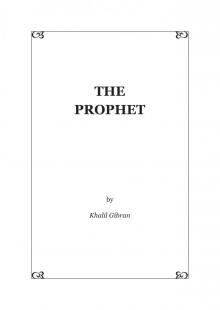 The Prophet
The Prophet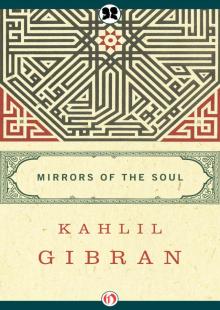 Mirrors of the Soul
Mirrors of the Soul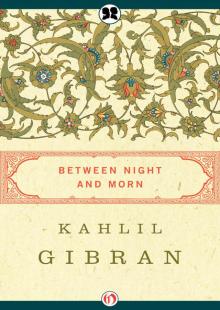 Between Night and Morn
Between Night and Morn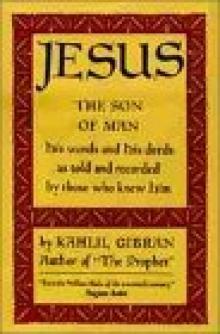 Jesus the Son of Man
Jesus the Son of Man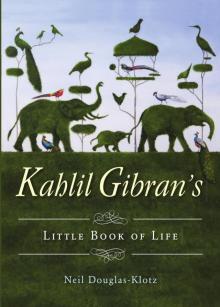 The Little Book of Life's Wisdom
The Little Book of Life's Wisdom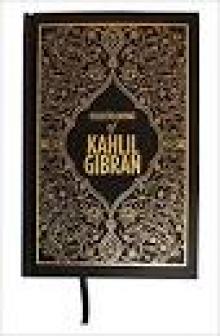 The Kahlil Gibran Collection
The Kahlil Gibran Collection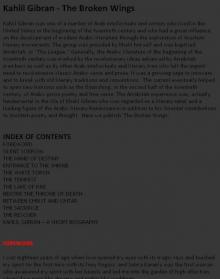 The Broken Wings
The Broken Wings Collected Poetical Works of Kahlil Gibran
Collected Poetical Works of Kahlil Gibran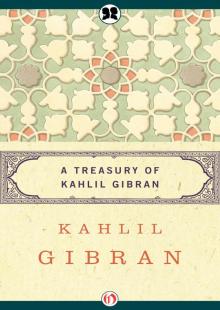 The Treasured Writings of Kahlil Gibran
The Treasured Writings of Kahlil Gibran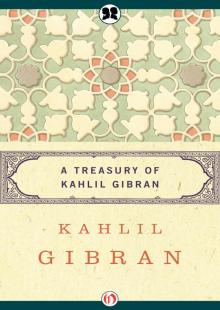 Treasury of Kahlil Gibran
Treasury of Kahlil Gibran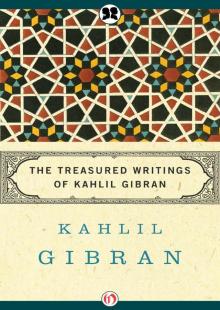 Treasured Writings of Kahlil Gibran
Treasured Writings of Kahlil Gibran